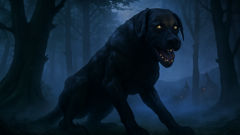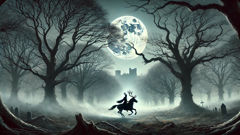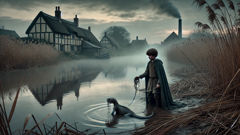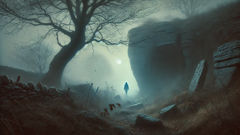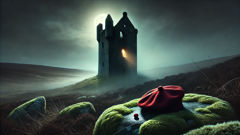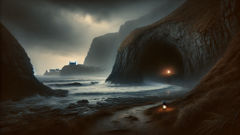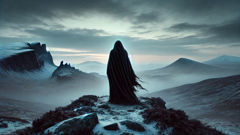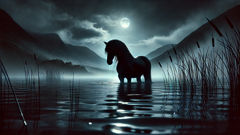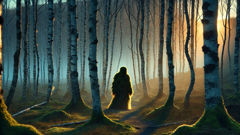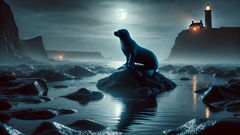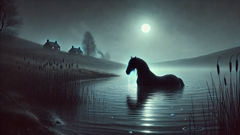Introduction
In the wild, brooding mountains of medieval Serbia, where thick pines sigh in ancient winds and shadows seem to move with minds of their own, villagers learned to listen closely to the forest. Evenings drew a hush across the earth, heavy with the scent of woodsmoke and moss. Tales, told in whispers around flickering fires, spoke of things that prowled in darkness—things older than the stones beneath their feet. Most stories faded with the dawn, but none chilled the marrow like those of the Psoglav. It was said this monstrous being haunted the ravines and hollows near villages, with a man’s body strong as oak roots, horse’s legs built for relentless pursuit, and a dog’s head crowned with razor-sharp iron teeth. Eyes like burning coals glowed through the mist, searching for the scent of fear and the taste of flesh. The Psoglav’s hunger was legendary; it devoured not just flesh, but souls, leaving only silence and sorrow in its wake. People posted charms on doorways and carved protective symbols into lintels, hoping to keep the beast at bay. Yet every few years, when the moon hung low and red in the sky, livestock would vanish, and sometimes—far worse—so would a child or elder, gone without trace. In one mountain village, nestled in a valley wreathed in fog and superstition, the legend became more than a story. It became a threat. And in that crucible of dread, one man—a healer named Jovan—would be forced to choose between fleeing from the darkness or facing it head-on. This is the tale of Jovan, the Psoglav, and the night when legend bared its iron teeth to the world.
The Night of Vanishing Shadows
The village of Gornja Reka huddled beneath towering cliffs, its stone cottages gathered like sheep under a shepherd’s gaze. By day, laughter mingled with the bells of grazing goats, but at night, a hush fell that even the bravest dared not disturb. It was during one such night—when the moon glowed red and swollen—that the trouble began. It started with a scream, slicing through the valley like a blade. Jovan awoke instantly. He’d spent years as the village healer, tending wounds and delivering babes into the world, but nothing in his experience had prepared him for the kind of fear that gripped him as he hurried outside. Torches flickered in trembling hands. A crowd gathered by the river, where the village’s youngest shepherd, Petar, stood sobbing and bloodied. “It took her,” he wept, voice cracking with terror. “Something with a dog’s head and teeth like knives—it took my sister!” The air reeked of copper and panic. Tracks, massive and horse-shaped but with claw marks gouged into the mud, led into the forest. Old Baba Milena spat into the dust and crossed herself. “Psoglav,” she muttered, her eyes wide with a terror that seemed to reach back through generations. “It’s come again.”
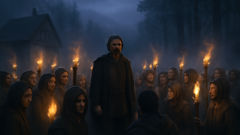
Fear swept through Gornja Reka like wildfire. Some wanted to lock their doors and pray for morning; others called for vengeance. Jovan knelt beside Petar and examined his wounds—deep, but not fatal. The healer’s mind whirred through herbs and poultices, but beneath it all was a chilling certainty: this was not a wolf, not a bear, but something out of legend. That night, the villagers gathered in the central hall. Their faces, lined with worry and exhaustion, turned to Jovan for guidance. Though not the oldest or most powerful, he held their trust. He stood up slowly, feeling the weight of eyes and expectations. “We cannot wait for the beast to grow bolder,” he said. “We must find it, or it will keep hunting us.”
Old men told stories of how their grandfathers had once driven the Psoglav away with fire and iron—symbols of human will and resolve. But few alive remembered the details. Jovan listened, soaking up every tale and rumor. The next morning, he gathered what he could: a satchel of healing roots and bandages, a stout walking stick, and an iron knife borrowed from the blacksmith. He painted a protective symbol on his brow with ash and left instructions for the villagers: keep close, burn fires bright, and trust no shadow.
He set off into the forest, accompanied by Petar—who refused to be left behind despite his wounds—and Stana, the smith’s daughter, whose courage was legend among the children. The woods were thick with mist and silence, broken only by the distant croak of ravens. As they ventured deeper, the land changed: trees grew gnarled and twisted, the underbrush thickened, and patches of scorched earth hinted at old, forgotten fires. Sometimes they glimpsed bones half-buried in moss or heard something moving just out of sight. On the second night, while they camped by an ancient yew, Jovan dreamed of a cavern choked with bones and a voice like thunder promising “hunger eternal.” He awoke shivering, convinced the dream was a warning—perhaps even a lure. Stana saw his unease. “Legends say the Psoglav can twist minds as well as tear flesh,” she whispered. “We must be careful.”
The next day brought them to the ruins of an old monastery, rumored to be cursed since the days when Ottoman armies swept through the land. Its arches stood blackened against the sky, and among the toppled stones, Jovan found claw marks gouged deep into the marble. That night, as twilight bled into darkness, a howl split the air. It was a sound no wolf could make—long, guttural, filled with rage and hunger. Jovan gripped his iron knife. “Tonight,” he said, “the hunt ends—one way or another.”
Into the Maw: The Cavern of Bones
The forest seemed to swallow all sound as the trio pressed onward, following tracks that twisted like serpents through the underbrush. Petar limped but would not stop; Stana pressed ahead with fierce determination; Jovan’s mind was split between dread and duty. They passed forgotten shrines half-choked by vines, remnants of older faiths that once held sway in these hills. Whenever they paused, Jovan murmured prayers to the saints and sprinkled dried herbs for protection.
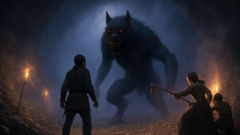
On the third day, the tracks led them to a ravine where the air grew colder and the trees gave way to stone. Moss hung like rags from jagged rocks, and a foul stench oozed from a cave mouth hidden behind a tumble of boulders. Stana knelt and pressed her ear to the earth. “Something moves below,” she whispered, voice trembling. Jovan drew his iron knife, tracing the protective symbol onto the hilt. “We go together—no matter what.”
Inside, the darkness was absolute. Their torches barely pierced it, casting jittering shadows on the stone. The walls were scratched and scored with claw marks; bones littered the floor—animal and human alike. Deeper in, they found signs of ritual: blackened skulls placed on altars of stone, strange runes smeared in old blood. The air was thick with malice. A shuffling echoed from the depths, followed by a wet, rasping breath.
Then it appeared. The Psoglav was bigger than any story could have warned—almost twice the height of a man, muscles rippling beneath mottled skin. Its horse legs stamped restlessly on the stone, and its dog’s head snarled, jaws parting to reveal a forest of iron teeth. Its eyes burned like embers in the gloom.
For a moment, terror threatened to root them in place. But Jovan stepped forward, holding the torch aloft and shouting words of defiance taught to him by his grandmother: “By light and iron, by heart and hand, begone, demon!”
The Psoglav recoiled as if struck, howling in rage. It charged. Petar threw himself aside; Stana swung her iron-tipped staff at its flanks. The fight was chaos—claws raked stone and flesh, torches tumbled, shadows danced. Jovan felt the beast’s hot breath on his face as it snapped at him, iron teeth missing his throat by inches.
But for all its strength, the Psoglav seemed to fear the iron blade and fire. Each time Jovan pressed forward, the creature withdrew, shrieking. It tried to twist their minds—visions of lost loved ones, whispers of despair—but Jovan remembered his dream and focused on a single thought: “We are not alone. Our ancestors stand with us.”
Finally, with a coordinated effort, they drove the beast back into the cavern’s depths. Stana hurled her torch onto a pile of old bones, igniting a fire that filled the cave with choking smoke. As the Psoglav shrieked in agony, Jovan plunged his iron knife into its shoulder. The creature howled and vanished into a fissure, trailing smoke and blood. Silence fell. They gathered Petar’s sister from a pile of debris—shaken but alive—and fled into the dawn.
In the cold light of morning, standing at the cave’s mouth, Jovan realized that legends held more than terror—they held warnings and wisdom. The evil had not been destroyed forever, but driven back. The villagers would need to remain vigilant. But for now, hope returned to Gornja Reka.
Echoes in the Ashes
The return to Gornja Reka was bittersweet. The villagers rejoiced at the safe return of Petar’s sister and the tale of their victory spread quickly. Old Baba Milena wept tears of gratitude and placed wreaths of herbs on the doors of every home. But beneath the celebrations lingered an uneasy quiet—a sense that the forest still watched and waited.
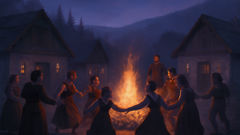
Jovan treated wounds and soothed frayed nerves, but he could not shake a new burden: knowledge. In the days that followed, he pored over scraps of parchment and relics hidden in the monastery ruins. He found stories older than Christianity itself—fragments of song about a world where creatures like the Psoglav were not just nightmares but guardians of balance, punishing those who trespassed sacred ground or broke ancient covenants.
He came to understand that the Psoglav was drawn not just by hunger, but by broken trust—between neighbors, between villagers and the land itself. The demon thrived on discord and fear. Over time, Jovan began to teach the people of Gornja Reka new ways to honor the old traditions: sharing bread with strangers, planting trees at the edge of fields, leaving offerings at forgotten shrines. The villagers resisted at first—old habits die hard—but little by little, harmony returned. Fires burned brighter at night, and laughter came more easily.
Still, Jovan never let down his guard. He trained the children in the use of iron and fire, taught them the words to old songs that drove away evil. He led yearly pilgrimages to the cavern, where they sealed the fissure with stones carved with prayers. Each time he looked into the shadows of the forest, he remembered the burning eyes and iron teeth—but also the courage that had saved them all.
Years passed. The legend of the Psoglav faded into story once more, but Jovan’s teachings remained. Travelers who visited Gornja Reka spoke of a village where kindness reigned and no one went hungry. They marveled at the iron charms hanging from every door, and at the festivals where flames danced through the night and everyone—young and old—sang songs to keep the darkness at bay.
And sometimes, when the moon rose red and swollen over the mountains, Jovan would walk alone to the forest’s edge and listen to the wind. If he heard a distant howl, he would smile—not in fear, but in remembrance. For he knew that as long as people stood together, no darkness—not even the Psoglav—could conquer their light.
Conclusion
The legend of the Psoglav endures because it carries more than a warning against wandering too far into dark woods. It’s a story about courage in the face of overwhelming terror, the strength found in unity, and the wisdom that comes from remembering where we come from. Jovan’s battle against the Psoglav did not end all evil, nor did it erase fear from Gornja Reka forever. But it changed the village and its people, teaching them that light and iron—their own will and traditions—could stand against darkness. In time, other villages adopted Gornja Reka’s ways: carving protective runes, cherishing kinship, and never letting hope be devoured by despair. Even now, when the wind howls across Serbian mountains and children ask about things that lurk in shadows, parents tell of Jovan, Stana, and Petar—the ones who faced the Psoglav and proved that monsters can be driven back if hearts remain brave and hands are joined. And so the story lives on: not just as a tale to frighten or entertain, but as a reminder that every generation must choose to stand against its own darkness, armed with memory, courage, and the light of those who came before.

